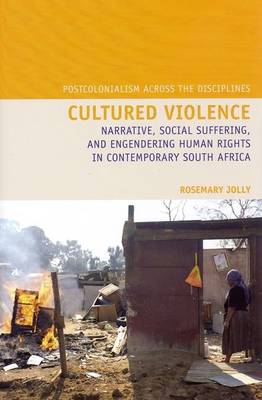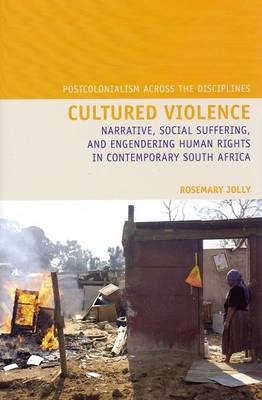
- Retrait gratuit dans votre magasin Club
- 7.000.000 titres dans notre catalogue
- Payer en toute sécurité
- Toujours un magasin près de chez vous
- Retrait gratuit dans votre magasin Club
- 7.000.0000 titres dans notre catalogue
- Payer en toute sécurité
- Toujours un magasin près de chez vous
Cultured Violence
Narrative, Social Suffering, and Engendering Human Rights in Contemporary South Africa
Rosemary JollyDescription
Cultured Violence explores contemporary South African culture as a test case for the achievement of democracy by constitutional means in the wake of prolonged and violent conflict. The book addresses key ethical issues, normally addressed from within the discourses of law, the social sciences, and health sciences, through narrative analysis. The book draws from and juxtaposes narratives of profoundly different kinds to make its point: fictional narratives, such as the work of Nobel laureate J.M. Coetzee; public testimony, such as that of the Truth and Reconciliation Commission, and Jacob Zuma's (the former Deputy President's) 2006 trial on charges of rape; and personal testimony, drawn from interviews undertaken by the author over the past ten years in South Africa. These narratives are analysed in order to demonstrate the different ways in which they illuminate the cultural "state of the nation" ways that elude descriptions of South African subjects undertaken from within discourses that have a historical tendency to ignore cultural dimensions of lived experience and their material particularity. The implications of these lived experiences of culture are underlined by the book's focus on the violation of human rights as comprising practices that are simultaneously discursive and material. Cases of such violations, all drawn from the South African context, include humans' use of non-human animals as instruments of violence against other humans; the constructed marginalization and vulnerability of women and children; and the practice of stigma in the context of the HIV/AIDS epidemic.
Spécifications
Parties prenantes
- Auteur(s) :
- Editeur:
Contenu
- Nombre de pages :
- 192
- Langue:
- Anglais
- Collection :
- Tome:
- n° 7
Caractéristiques
- EAN:
- 9781846312137
- Date de parution :
- 22-07-10
- Format:
- Livre relié
- Format numérique:
- Genaaid
- Dimensions :
- 155 mm x 234 mm
- Poids :
- 439 g







